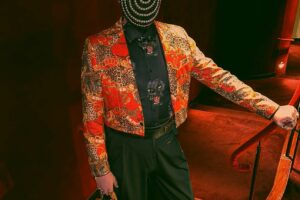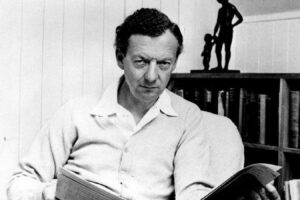

Friday night’s fleet revival of Robert Carsen’s witty updated 2013 Met production proved to be no exception with the splendidly larger-than-life Ambrogio Maestri back to head up a vivacious and game cast led by Richard Farnes in an impressive house debut.
The riches of Verdi’s final masterpiece remain surprising every time I hear them; little in the composer’s operatic oeuvre prepares you for the delicious invention of his and Boito’s masterful adaptation of Shakespeare’s The Merry Wives of Windsor.
He waited more than 50 years after the unsuccessful Un Giorno di Regno to again tackle a comic opera; although Falstaff delivers big laughs with its over-the-top farcical hijinks it’s also suffused with sweet romance and wistful melancholy.
None of these aspects are shirked by Carsen’s whirlwind approach revived this season by Gina Lapsinki. If some of the funny business was a bit broader than it was five years ago, both the performers and the audience had a rollicking good time occasionally tempered with a tear or two.
Maestri, who must have portrayed Sir John well over a hundred times by now, showed no signs of coasting on his vast experience and delivered a refreshingly subtle and humane portrayal of the boastful yet foolish knight.
Initially appearing scarily unkempt in soiled long-johns, the baritone was transformed in the second act into a still-dapper roué first in stylish tweeds then in sporty bright-red hunting attire. His bungling attempted seduction of Alice followed by his riotous water-logged humiliation became both amusing and touching for Maestri never lost touch with Falstaff’s ruined dignity.
If his high notes didn’t quite have the freedom they had the last time, his voluminously booming baritone once again resounded throughout the Met. He savored Boito’s delicious text particularly in the blistering “L’onore” and sad “Va, vecchio John” monologues.
That he literally towered over his nemesis Dr. Caius and cronies Bardolfo and Pistola (delightfully—and sonorously–embodied by Tony Stevenson, Keith Jameson and Richard Bernstein) only added to the levity. Though Maestri could surely have made the evening all about himself, he proved an exemplary colleague and never hogged the spotlight.
Ailyn Pérez’s sparkling Alice and Jennifer Johnson Cano’s wacky Meg enthusiastically headed up the boisterous female conspiracy intent on providing the lecherous knight with his much-needed comeuppance.
Pérez excelled when she could revel in her lush middle voice but was hard-pressed by the low writing in her third-act narrative. Golda Schultz’s seraphic Nanetta suggested that she’s not only South African soprano at the Met these days worthy of headlines. Her silvery “Sul fil d’un soffio etesio” ravished the ear and perfectly captured its heady moonlit magic; One eagerly awaits her Der Rosenkavalier Sophie due in December.
Marie-Nicole Lemieux, who debuted last month as Geneviève in Pelléas et Mélisande, returned with a bawdy Mistress Quickly that might have been more effective with a less-is-more approach.
While the deep lows of her multiple “Reverenzas” resounded a bit less thunderously than those of some of her predecessors, her middle and top of her voice have become less smooth and full than they were when I first heard her in Vivaldi’s La Fida Ninfa in Paris 15 years ago. One wonders if recent encounters with Azucena, Carmen and Dalila were altogether wise.
Francesco Demuro’s impetuous and ardent Fenton shone in his third-act apostrophe while Juan Jesús Rodriguez’s strapping Ford turned his “E sogno?” monologue into a tortured exploration of threatened uptight masculinity. While he started out in slightly cloudy form, he warmed up during his unusually intense encounter with Falstaff and revealed some strong trumpet-y top notes.
Falstaff at the Met remained the property of its former Music Director for decades so it was almost a shock to see someone else take the podium. Farnes, previously unknown-to-me, was the seventh and final new conductor to debut this season, a refreshing change given the house’s sometimes lazy reliance on the same old, often uninspired maestros season after season.
Farnes drew finely detailed and sumptuous playing from his orchestra and set challengingly swift tempi for the raucous ensembles which occasionally got away from his otherwise alert cast–especially in the first act.
But by that final glorious fugue everyone was blissfully in sync and it proved—as always—a heady and exhilarating conclusion to a wonderfully enjoyable evening. By the way, the organization that provided the ovation-earning horse that threatened to kick down the third-act set might want to reconsider its name: All-Tame Animals, Inc.
Six more performances remain of one of the very best shows the Met has presented this season.
Photo: Karen Almond / Met Opera


























Comments